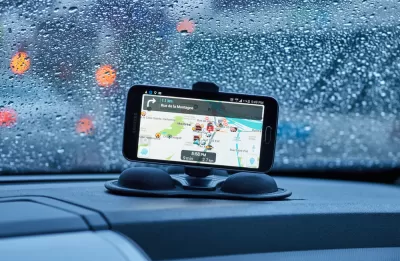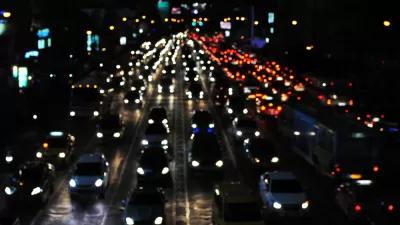The companies behind navigation apps say they want to decrease congestion in cities. But a tool that is essentially designed to help individuals isn’t going to provide a collective benefit.

Laura Bliss looks at the impact of navigation apps such as Waze and the purported benefits that come from crowdsourced traffic data. Waze says it provides a social good, but it is a private company looking to a turn a profit. This means that the value of data, and not the value of transportation outcomes, will inevitably be what drives the use of the technology.
"This gets to the heart of the problem with any navigation app—or, for that matter, any traffic fix that prioritizes the needs of independent drivers over what’s best for the broader system. Managing traffic requires us to work together. Apps tap into our selfish desires," says Bliss.
Bliss discusses the ideas of induced demand and the Nash equilibrium, where individual self-interest prevails, even when a different decision would help the larger group. "Road traffic is a great example: absent other incentives, I’m always going to choose the fastest route home that is available to me, even though taking a longer, more circuitous route would help spread out traffic and ease congestion for other drivers across my city."
And navigation systems help facilitate this behavior, since more drivers looking for faster routes leads to more traffic dumped on to residential roadways and congestion spread out on other parts of the network. The solution to urban traffic, says Bliss, might be more about redefining the problem as one of access instead of speed.
"It’s easy to believe we’re being guided on the smartest routes when we’re using them, even when the streets are as familiar to us as the scuffed leather of the steering wheel. But no single tool is going to 'solve' congestion, despite the claims of tech companies," argues Bliss. Instead, she says, tackling congestion involves thinking about how to increase mobility and offer alternatives to driving through land use, urban design, and multimodal transportation systems.
FULL STORY: Navigation Apps Changed the Politics of Traffic

Alabama: Trump Terminates Settlements for Black Communities Harmed By Raw Sewage
Trump deemed the landmark civil rights agreement “illegal DEI and environmental justice policy.”

Study: Maui’s Plan to Convert Vacation Rentals to Long-Term Housing Could Cause Nearly $1 Billion Economic Loss
The plan would reduce visitor accommodation by 25% resulting in 1,900 jobs lost.

Planetizen Federal Action Tracker
A weekly monitor of how Trump’s orders and actions are impacting planners and planning in America.

Waymo Gets Permission to Map SF’s Market Street
If allowed to operate on the traffic-restricted street, Waymo’s autonomous taxis would have a leg up over ride-hailing competitors — and counter the city’s efforts to grow bike and pedestrian on the thoroughfare.

Parklet Symposium Highlights the Success of Shared Spaces
Parklets got a boost during the Covid-19 pandemic, when the concept was translated to outdoor dining programs that offered restaurants a lifeline during the shutdown.

Federal Homelessness Agency Places Entire Staff on Leave
The U.S. Interagency Council on Homelessness is the only federal agency dedicated to preventing and ending homelessness.
Urban Design for Planners 1: Software Tools
This six-course series explores essential urban design concepts using open source software and equips planners with the tools they need to participate fully in the urban design process.
Planning for Universal Design
Learn the tools for implementing Universal Design in planning regulations.
Caltrans
Smith Gee Studio
Institute for Housing and Urban Development Studies (IHS)
City of Grandview
Harvard GSD Executive Education
Toledo-Lucas County Plan Commissions
Salt Lake City
NYU Wagner Graduate School of Public Service





























